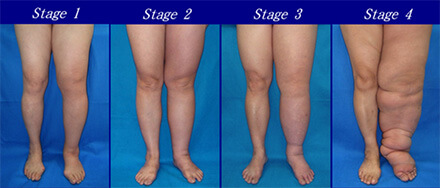Connect With Us
Lymphedema

Lymphedema or swelling may either be genetic (primary) or caused by a medical condition, or a treatment that blocks or removes your lymphatic system (secondary). When the lymphatic system does not function properly, the body cannot filter nor flush out waste which causes an excess of fluid to build up in your tissues.
You may be more at risk of developing lymphedema if you are obese, an older adult, suffer from rheumatoid or psoriatic arthritis, have/had cancer or have undergone cancer treatment, or have an infection from a tropical country.
Lymphedema may occur anywhere, but it is most common in the lower legs, and typically affects only one side of the body. Additional symptoms may include pain, heaviness, tightness, thickened skin in the advanced stages of lymphedema, reduced range of motion in the area, and lymphedema ulcers.
While lymphedema cannot be cured, lymphedema can be managed, and lymphedema ulcers should be monitored and treated by a podiatrist who can help slow the progression of the disease, reduce swelling and alleviate pain with a variety of therapies and treatment options.
If you are exhibiting any of the symptoms listed above, contact a podiatrist today.